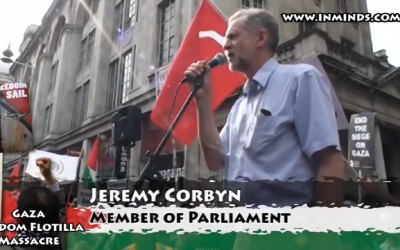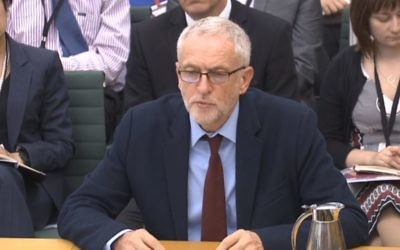A representative of the far-left – a committed anti-Zionist – has defied pundits and pollsters alike by emerging victorious from a contest which could define the direction of his political party for years to come.
Within the Jewish community, there is trepidation. Victory in the forthcoming election could leave this candidate in a position to exercise significant control over aspects of their daily lives – and he stands against something they consider central to their identity. These fears are not uniformly shared – anti-Zionist Jews are thrilled – but a significant percentage are deeply concerned.
As you’ve probably figured out by now, I could be writing about either of two events. This week, Zohran Mamdani managed a significant political upset by winning the Democratic primary for mayor of New York City. But a decade ago, Jeremy Corbyn won the Labour party leadership election in the UK.
The cases, while similar, are not identical; different countries, different political positions and different – though kindred – political parties. Then there are the two people themselves – Mamdani, at 33, is exactly half the age Corbyn was when he became Labour leader. Mamdani is a brilliant public speaker and a natural media performer; Corbyn is the opposite. Corbyn always appears fundamentally uncomfortable when speaking to those who do not agree with him; Mamdani, by contrast, seems to have an ability to connect with almost any audience – even a hostile one.
But for the purposes of the Jewish community, the similarities hold. An anti-Zionist with a history of deeply troublesome public statements has won an important internal party contest. They have done so despite the publicly aired concerns of many Jews. If they win a forthcoming election, they will have a great deal of influence over aspects of day-to-day life.
With this in mind, I thought it might be helpful for New York Jews to be aware of recent history across the Atlantic, and prepare ahead of time for certain situations which may be coming their way.
Labour leader Jeremy Corbyn giving his keynote speech at the party’s annual conference in 2018 .Credit: Stefan Rousseau/PA Wire
1. Get ready for more
Right now, as far as many Jews are concerned, the available information about Mamdani isn’t promising. He started his local Students for Justice in Palestine chapter when at college, he’s been a fixture at anti-Israel marches, his statement immediately after 7 October focused on the Israeli government without even mentioning Hamas, and last week his attempts to defend the phrase “globalise the intifada” earned him public criticism from the United States Holocaust Museum.
In the coming months, expect to see far more statements and videos from Mamdani emerge into the public eye. His supporters will claim that this is part of a concentrated attempt to “smear” him (get used to that word, you’ll be hearing it a lot). The reason, however, is simple. Both the wider media and significant political opponents have no reason to conduct detailed research into your previous statements or actions when you’re a nonentity. The more significant you become, the more your previous words and deeds come under the microscope. For Mamdani, every recorded Zoom event during the pandemic, every bit of grainy mid-2010s video footage of a speech at a rally, every open letter signed will now come under the microscope. And the likelihood is that at least some of the stories published as a result will make a significant percentage of New York Jews feel even more concerned than they already do.

Zohran Mamdani Speaking at a DSA 101 Meeting at the Church of the Village in NYC (Credit: Wikimedia Commons/Bingjiefu He)
2. Rallying behind the party flag
Whether out of nervousness of being targeted, or simple expediency, a wide range of politicians and activists will line up to pledge fealty to the new Chosen One. At a local level, Jewish Zionists should expect to see friends, neighbours and former close political allies ignore their concerns and publicly express full-throated support for Mamdani
If, sooner or later, that candidate loses their position within the party, New York Jews should expect a significant percentage of the people who are now abandoning them to treat the entire episode as an unfortunate blip. A prominent British Jew I know, who was also a member of the Labour party, described to me how after Corbyn had stepped down in 2019, he had been approached by a party colleague who had vocally embraced and supported Corbyn, despite being perfectly aware of how many British Jews felt about him. This colleague didn’t apologise for her conduct during that period – she simply expressed relief that such a difficult period was now over. “Difficult for whom, exactly”, the Jewish person wanted to say (but didn’t, because British people generally prefer to seethe inwardly).

Jeremy Corbyn pictured at an anti-Israel demonstration in 2010
3. The cult is coming to town
It is hard to explain to a bystander how deranged a significant subsection of British politics became for a few years. Jeremy Corbyn had followers who non-ironically treated him as the Messiah. They drew terrible pictures of him. They wrote awful poetry about him. They attempted to rewrite history to suggest that he had played a significant role in the Northern Ireland peace protest.
Mamdani is far more charismatic than Corbyn. The adulation he will receive is likely to be even more extreme – and the flip side of that is that those who oppose him will likely see themselves targeted in even more unpleasant ways.

(Credit: Wikimedia Commons/ Karamccurdy)
4. Being thrown under the bus
For almost half a decade, a significant majority of British Jews had to deal with the understanding that for many others, their concerns and fears simply did not matter. At best, they were treated as hysterical. At worst, they were accused of “weaponizing antisemitism” (again, get used to that phrase, you’ll be hearing it non-stop) to try and halt the implementation of a proper socialist agenda.
This was all the more painful for Jewish people who may have had a record of support for other minority groups. In some cases, that solidarity was returned – in many others, it wasn’t. It’s what led to the publishing of a book – and the use of a slogan – which remains in use today – “Jews don’t count”.

5. The Useful Jewish Friend™
As previously mentioned, British Jews were not uniformly opposed to Jeremy Corbyn. There was a small but devoted group, on the fringes of the UK Jewish community, who made it their full-time purpose to defend Corbyn and his close political associates from any allegations of antisemitism which came their way, no matter how egregious.
This group will be considerable larger in the US –the Jewish population of New York city alone is four times the size of the UK’s Jewish population – but also because America, as the most pampered diaspora country (forgive me, but it’s true), has a higher percentage of Jews who are either vocally anti-Zionist or who seem remarkably ambivalent about promoting people who loathe them.
In the coming months you will be able to create an entire new Talmud-sized collection of tweets, posts and articles which will all effectively say the same thing – “I am Jewish and I’m telling you that there’s nothing to worry about here, those other Jews are fearmongering for their own insidious reasons”. It’s a whole subgenre waiting to be written, and I’m afraid, New York, that you’re about to be on the receiving end.

Jeremy Corbyn speaking at the Home Affairs Select Committee
6. Your friendly neighbourhood antisemitism expert
As if number five wasn’t enough, you’re about to experience a massive surge in an already popular subculture – left-wing non-Jewish people lecturing Jews on what antisemitism is and isn’t. This is certainly not limited to one side of the political spectrum – Jewish anti-Zionists have pointed out for years that Christian Zionists accuse them of antisemitism – but the Right is not traditionally associated with a sensitivity to lecturing minorities about what they do and don’t stand for. The Left, which very much prides itself on such sensitivities, is apparently prepared to make an exception here.
Expect it all – “anti-racism” activists sharing pictures of Neturei Karta (the Westboro Baptist Church of the Jewish world) and referring to them as “the real Jews” or academics descending from their ivory towers to lecture you about how the centrality of Israel to Judaism is coincidental or allegoric. You will see people publicly deny that something is antisemitic and assume that they must be Jewish – because how else would they have the chutzpah to give their opinion on the matter – only to find that they are not.

Police take down controversial poster depicting Bibi Netanyahu targeting Jeremy Corbyn, as seen at Labour conference (Theo Usherwood on Twitter)
7. Tough choices
Jewish democrats who are Zionists will have two options – leave the party and try to build something else, or stand and fight. The latter will be tough – there will be attacks from both the far-left of the party, as well as an increasing number of Jews who will view the party with animosity and consider it beyond redemption.
But it is not too late. Remind yourself that in New York, the main alternative to Zohran Mamdani was, inexplicably, a former Governor who resigned four years ago after being repeatedly accused of sexual misconduct. Despite what his supporters may claim, that is not an overwhelming vote of confidence for some inevitable triumph of anti-Zionism, either in New York or America as a whole. Politics is tidal – and while it’s possible that anti-Zionism will continue to flourish within the Democratic party, it is also possible that it is reaching its high watermark. While the Labour government we have now can certainly be critical of Israel, it is a far cry from what we would have seen if Jeremy Corbyn had become Prime Minister. Don’t despair – look at the UK as an example of how Jews can come together for a political fightback.